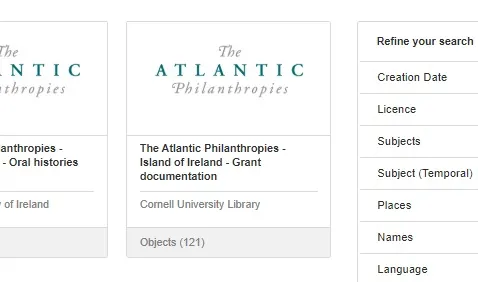In this blog post, we look at the benefits of using the DRI Batch Metadata Template for the Atlantic Philanthropies Archive Project.
In the second part in our series of blog posts discussing how to capture metadata using the DRI Batch Metadata Template, we look at the benefits of using the template for the Atlantic Philanthropies Archive Project. If you want to learn more about using the DRI metadata template itself, see our earlier post on ‘Metadata for Researchers’ and watch this space for the next in the series.
The Atlantic Philanthropies Archive Project
by Anja Mahler, Digital Archivist
My role in this project is to develop guidelines, collection structures, ingest schedules and metadata policies, as well as the hands-on creation of metadata and ingestion of digital objects into the DRI.
When embarking on the project in 2018, I familiarised myself with the project, the desired outcomes and how to ingest data into DRI. I learned there are two methods of ingesting data to DRI – batch ingest and individual object ingest – and I was faced with deciding on a workflow before metadata creation and ingest began in earnest. I chose to use the DRI Batch Metadata Template in the form of a MS Excel spreadsheet to generate metadata and batch ingest objects to DRI. This workflow usually makes good sense if there is existing data that needs to be conformed, and large amounts of data to be ingested, but there were numerous other benefits for this project. To make the decision about the workflow, I considered the following questions about the project:
What is the Atlantic Philanthropies Archive Project?
DRI has embarked on a three-year project that seeks to document the work of The Atlantic Philanthropies on the island of Ireland. Over a period of 30 years, The Atlantic Philanthropies invested €1.6 billion on the island of Ireland to advance higher education, human rights, further the peace process in Northern Ireland, and improve services and policies for young people and older adults. The impact of the investment in Ireland has been described as vast and at times transformational. DRI will provide a window into how change was amplified by The Atlantic Philanthropies by curating a selection of documentation relating to its grant-making activities.
What type of data is collected, when and how?
Throughout the project, the DRI will draw materials from grant-making records of The Atlantic Philanthropies archive housed at Cornell University Library’s Division of Rare and Manuscript Collections in Ithaca, New York. Here, records that document the entire life cycle of grants, such as proposals, final reports and printed ephemera, exist in either digital or hardcopy format. In addition to collecting grant documentation, DRI will also create oral histories that relate to the chosen grants and records. The team is also commissioning a number of essays that provide insights and experiences from people who have been involved in, researched, or studied Atlantic-funded projects.
How can the data be accessed and retrieved?
All records for this collection will be accessible on the DRI. Additionally, the DRI will use Spotlight, an open source virtual exhibition platform tool developed by Stanford University, to create a distinct exhibition for the collections.
How is the collection structured?
In DRI, the collections will firstly be structured by depositor. For example: for the collection ‘The Atlantic Philanthropies – Island of Ireland – Grant documentation’ (shown in the image below), the depositor is Cornell University Library. After that, there will be sub-collections such as the grantee and the particular grant, which is how the collection was structured originally by Atlantic. The virtual exhibition will be curated by themes and sub-themes, such as ‘human rights’ and ‘disability’.

What are the benefits of using the DRI Batch Metadata Template for The Atlantic Philanthropies Archive Project?
– Diverse content creation and curation will continue throughout the project. With a bigger and better picture of the collection evolving gradually, more taxonomies are likely to be introduced. Therefore, metadata creation in a template spreadsheet means that any changes can be applied, with ease, for multiple records and collections.
– Complex linking of records and collections through subject headings and relationship information is likely to be subject to continuous change for this project. This element of metadata creation also benefits from the template spreadsheet, as any changes across multiple records or collections can be applied with ease.
– To facilitate access to data on a distinct virtual exhibition platform, the listing and grouping of metadata is likely to be needed. The accumulation of metadata in the template spreadsheet can facilitate this.
– As the records pass through pre-accession phases such as digitisation, redaction, and access permission, keeping track of and exchanging information with partners is essential. A ‘one-stop shop’ spreadsheet is ideal for the object entry phase before the object becomes accessioned, or in other words, ingested.
– Generating metadata with a template can improve quality control of metadata by using Open Refine, a tool to spot inconsistencies in metadata before ingesting to the DRI, where another preview can assure best quality. From Open Refine, metadata can be easily exported to xml files in preparation for batch ingest to the DRI.

(Image: screenshot of The Batch Metadata Template)
Watch this space for the next installment in this series. In the meantime, The Batch Metadata Template can be found here: Digital Repository of Ireland Batch Metadata Template.




